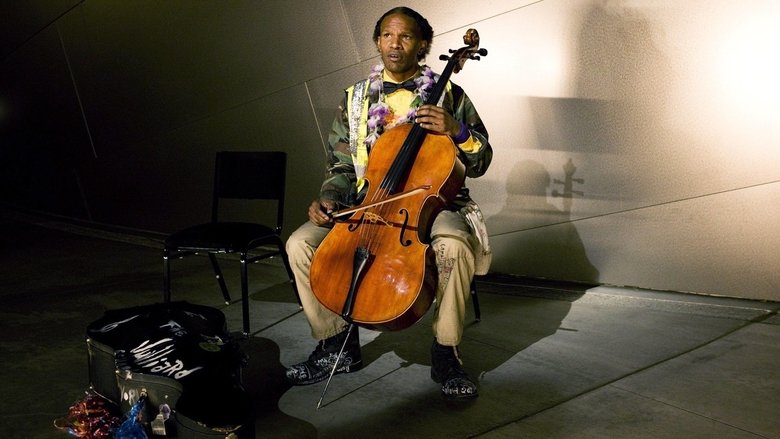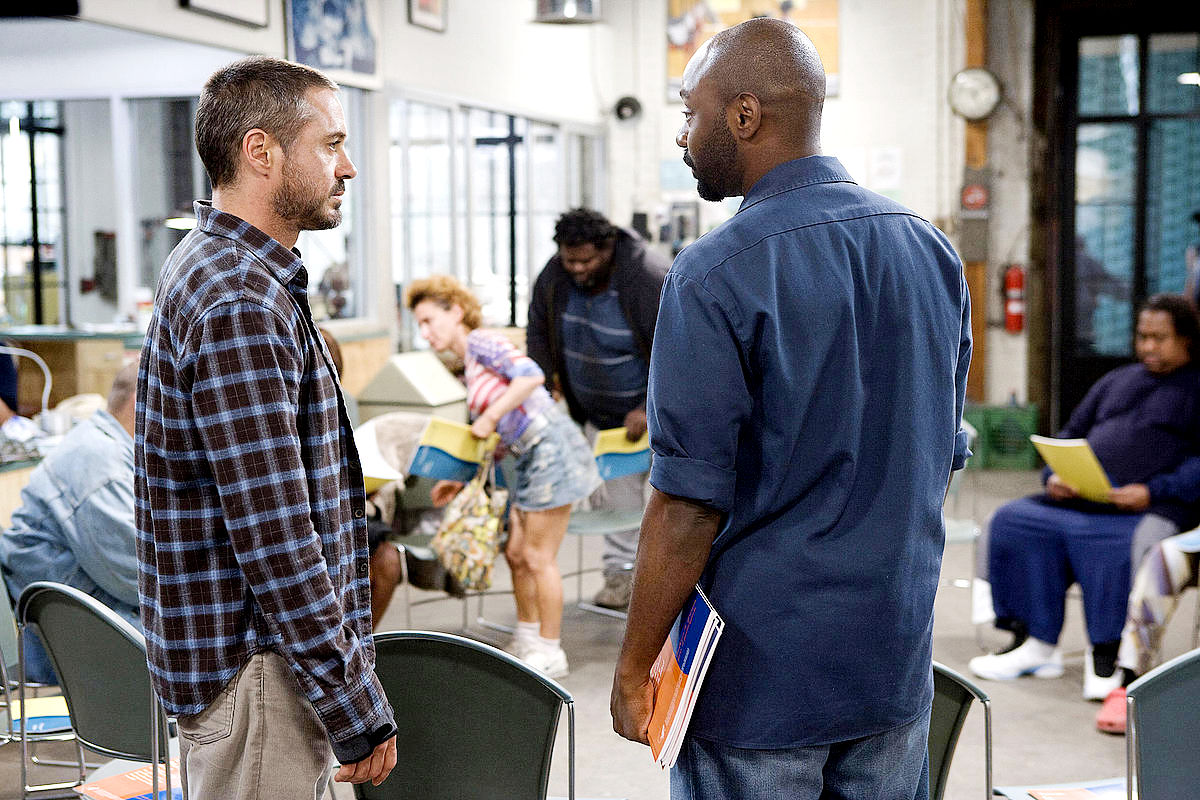← Back to Reviews

in

A compelling, fact-based story and a couple of powerhouse starring performances ignite The Soloist, a 2009 drama which attempts to put a human face on some hot-button issues, but, at times, seems to sacrifice the reality of the situations presented here for dramatic effect.

The film stars Robert Downey Jr. as Steve Lopez, a writer for the LA Times, who happens upon a homeless man playing the violin and after a tentative encounter, learns that the man is named Nathaniel Ayers and spent 2 years studying the cello at Julliard, but did not graduate. Lopez finds himself drawn to the man, not to mention deciding that his story would make great material for his paper, but struggles to connect with the man, whose obvious mental health issues make it very difficult for Lopez to help the man, despite the fact that the series of articles he has written about Nathaniel are garnering attention and acclaim for him.

The film is an emotionally charged look at Lopez' tireless obsession with making a personal connection with this gifted musician whose life went astray at some point and his frustration with the fact that he is powerless to help Nathaniel in the way that he needs the most help...help with his mental issues, that from what we've been shown, could be anything from autism to schizophrenia. The problem is that like a lot of people with serious mental issues, they are unaware that they have mental health issues and as long as they are not a danger to themselves or others, they cannot be forced into psychiatric treatment or medication that could help them and this is an issue that this story completely nails. Lopez' desire to help Nathaniel is the core of this story and the fact that he is powerless in securing this kind of help for the man, it doesn't matter that he actually finds the man a place to live or even gets his talent as a musician recognized, as long as his mental issues aren't properly addressed, he can never be a whole person again, something Lopez has difficulty accepting.

Flashback sequences provide a peek into Nathaniel's past and we do see the beginning of his mental decay during an orchestra rehearsal where Nathaniel starts to hear voices in his head, but we are provided no further insight into the man's mental decay, which I found kind of aggravating.
There is also a scene where a worn out Lopez appears to be giving up on Nathaniel and Nathaniel's response is to start asking Lopez personal questions about his own life, which just rang totally false to me...most mentally challenged people are in their own world and not prone to reaching out to others. I also had a problem with the idea of arranging for Nathan to actually give a recital. I had a hard time believing that Nathaniel would agree to such a thing but his reaction to being onstage legitimized that.
What does ring true though is Jamie Foxx's brilliant performance as Nathaniel, which totally nails the character's delicate mental sensibilities...the way he constantly talks and you think he's not listening at all, but he does catch things here and there and the way he remembers everything he learned about Lopez during their first meeting when they meet for the second time, an ability which made me think there might be some facet of autism involved in Nathaniel's condition. He's in his own world but certain facts do register and lodge in his memory banks without ever exiting his personal mental orbit of which he is a virtual prisoner.
.jpg)
Robert Downey Jr. matches Foxx note for note with a vivid performance that is so human that you almost don't see him acting. The performance is also a wonderful acting study in reaction and playing off the actions of another actor. Watch him when he takes the cello out of Nathaniel's arms that he received as an anonymous gift for Nathaniel or when Nathaniel gets physical with him at the end of the film. Robert Downey Jr. doesn't make a false move here and it is easy to overlook his work in the midst of Foxx's flash. I have a feeling that a lot of the direct communication between Lopez and Nathaniel was enhanced through Susannah Grant's screenplay for heightened drama rather than realism. Communicating with the mental ill, especially those with schizophrenia or autism, is a lot more difficult than depicted here.
Bouquets to Catherine Keener and Lisa Gay Hamilton for bringing substance to the thankless roles of Lopez' editor/ex-wife and Nathaniel's sister, respectively.
This film is a sobering indictment on the plight of the homeless and the mentally ill that even though slightly-over dramatized, pushes a lot of hot buttons and will definitely gnaw at your emotions. 8.5/10
A compelling, fact-based story and a couple of powerhouse starring performances ignite The Soloist, a 2009 drama which attempts to put a human face on some hot-button issues, but, at times, seems to sacrifice the reality of the situations presented here for dramatic effect.

The film stars Robert Downey Jr. as Steve Lopez, a writer for the LA Times, who happens upon a homeless man playing the violin and after a tentative encounter, learns that the man is named Nathaniel Ayers and spent 2 years studying the cello at Julliard, but did not graduate. Lopez finds himself drawn to the man, not to mention deciding that his story would make great material for his paper, but struggles to connect with the man, whose obvious mental health issues make it very difficult for Lopez to help the man, despite the fact that the series of articles he has written about Nathaniel are garnering attention and acclaim for him.

The film is an emotionally charged look at Lopez' tireless obsession with making a personal connection with this gifted musician whose life went astray at some point and his frustration with the fact that he is powerless to help Nathaniel in the way that he needs the most help...help with his mental issues, that from what we've been shown, could be anything from autism to schizophrenia. The problem is that like a lot of people with serious mental issues, they are unaware that they have mental health issues and as long as they are not a danger to themselves or others, they cannot be forced into psychiatric treatment or medication that could help them and this is an issue that this story completely nails. Lopez' desire to help Nathaniel is the core of this story and the fact that he is powerless in securing this kind of help for the man, it doesn't matter that he actually finds the man a place to live or even gets his talent as a musician recognized, as long as his mental issues aren't properly addressed, he can never be a whole person again, something Lopez has difficulty accepting.

Flashback sequences provide a peek into Nathaniel's past and we do see the beginning of his mental decay during an orchestra rehearsal where Nathaniel starts to hear voices in his head, but we are provided no further insight into the man's mental decay, which I found kind of aggravating.
There is also a scene where a worn out Lopez appears to be giving up on Nathaniel and Nathaniel's response is to start asking Lopez personal questions about his own life, which just rang totally false to me...most mentally challenged people are in their own world and not prone to reaching out to others. I also had a problem with the idea of arranging for Nathan to actually give a recital. I had a hard time believing that Nathaniel would agree to such a thing but his reaction to being onstage legitimized that.
What does ring true though is Jamie Foxx's brilliant performance as Nathaniel, which totally nails the character's delicate mental sensibilities...the way he constantly talks and you think he's not listening at all, but he does catch things here and there and the way he remembers everything he learned about Lopez during their first meeting when they meet for the second time, an ability which made me think there might be some facet of autism involved in Nathaniel's condition. He's in his own world but certain facts do register and lodge in his memory banks without ever exiting his personal mental orbit of which he is a virtual prisoner.
.jpg)
Robert Downey Jr. matches Foxx note for note with a vivid performance that is so human that you almost don't see him acting. The performance is also a wonderful acting study in reaction and playing off the actions of another actor. Watch him when he takes the cello out of Nathaniel's arms that he received as an anonymous gift for Nathaniel or when Nathaniel gets physical with him at the end of the film. Robert Downey Jr. doesn't make a false move here and it is easy to overlook his work in the midst of Foxx's flash. I have a feeling that a lot of the direct communication between Lopez and Nathaniel was enhanced through Susannah Grant's screenplay for heightened drama rather than realism. Communicating with the mental ill, especially those with schizophrenia or autism, is a lot more difficult than depicted here.
Bouquets to Catherine Keener and Lisa Gay Hamilton for bringing substance to the thankless roles of Lopez' editor/ex-wife and Nathaniel's sister, respectively.
This film is a sobering indictment on the plight of the homeless and the mentally ill that even though slightly-over dramatized, pushes a lot of hot buttons and will definitely gnaw at your emotions. 8.5/10
